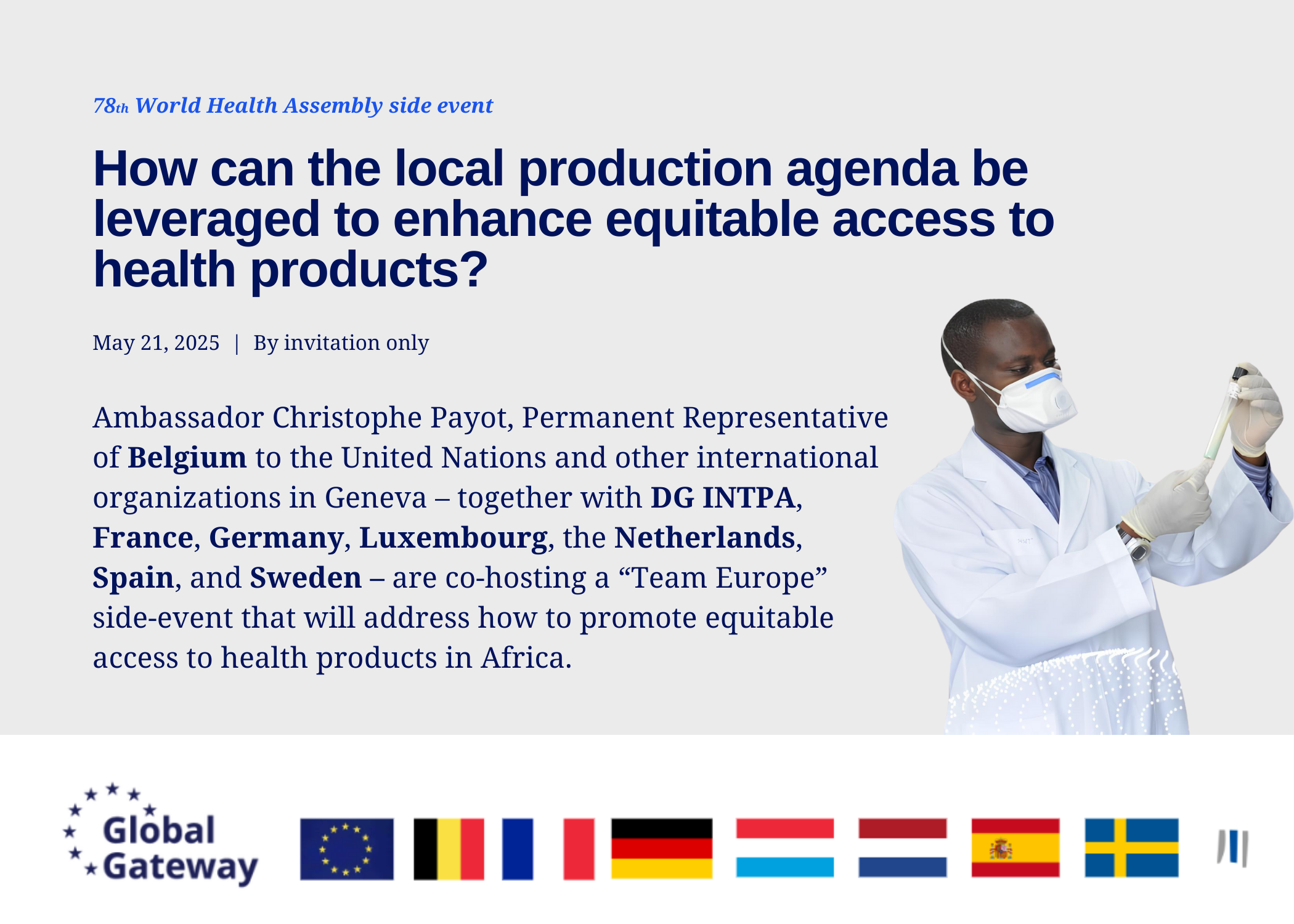Event: Navigating evolving contexts: From local production to equitable access – lessons from MAV+ on bridging the gap
News details
78th World Health Assembly.side event
Ambassador Christophe Payot, Permanent Representative of Belgium to the United Nations in Geneva, with DG INTPA, France, Germany, Luxembourg, the Netherlands, Spain, and Sweden are co-hosting the Team Europe event “Navigating evolving contexts: From local production to equitable access – lessons from MAV+ on bridging the gap” on the margins of the 78th World Health Assembly.

EVENT DETAILS
- Date: May 21, 2025
- Hosted by: Permanent Representation of Belgium in Geneva with Team Europe co-hosts DG INTPA, France, Germany, Luxembourg, the Netherlands, Spain, and Sweden
- Note: This event is invite-only. If you would like to be added to the waitlist, please contact Sofia Imad (sofia.imad@enabel.be) and Alexis Ditkowsky (alexis.ditkowsky@giz.de) from the Team Europe Support Structure MAV+.
BACKGROUND AND RATIONALE
Access to health products remains a critical issue today, with billions of people worldwide lacking adequate and consistent access to quality health products. This multifaceted challenge includes issues such as the lack of equitable access to medical countermeasures during outbreaks, drug shortages caused by structural issues and vulnerabilities in the supply chain, affordability challenges, and growing vaccine hesitancy. This lack of equitable access can result in poor health outcomes, with diseases or conditions remaining undiagnosed, untreated, or sub-optimally treated.
In response to these challenges and to global supply chain disruptions, the local production agenda has gained momentum. Various stakeholders, including the African Union and Africa CDC, have developed strategies to support local manufacturing of vaccines and other health products. This initiative is supported by MAV+, which aims to foster equitable access to health products, stimulate local production capabilities and enhance self-sufficiency in health product manufacturing across Africa. Team Europe is working closely with Team Africa, multilateral partners – including WHO – and the private sector to accelerate manufacturing and equitable access to health products through MAV+ in Africa as part of the Global Gateway strategy. The EUR 2 billion portfolio includes dozens of projects and implementers.
Local production can significantly improve equitable access to health products by increasing availability, fostering strategic production of essential medicines, and enhancing supply chain resilience. By producing health products locally, manufacturers can better meet national market demands, adapt products to local preferences, and ensure wider distribution, particularly in remote areas.
In a time of budget constraints, it is crucial to maximize our impact by carefully reflecting on how the local production agenda can best improve equitable access to health products. This involves leveraging the strengths of local manufacturing to ensure that health products are available, accessible, acceptable, and of high quality. By fostering strategic partnerships, investing in resilient supply chains, and prioritizing the production of essential medicines, we can enhance the stability and availability of health products. Additionally, learning from the experiences of different stakeholders and projects will help us refine our strategies and address access gaps more effectively. Through a collaborative and innovative approach, we can ensure that the local production agenda significantly contributes to improved health outcomes and equitable access to essential health products for all.
OBJECTIVES OF THE EVENT
This side event aims to explore how the local production agenda can be leveraged to enhance equitable access to health products. More specifically, the session seeks to:
- Identify key stakeholders and their roles in improving equitable access to health products, ensuring a clear understanding of responsibilities across the ecosystem.
- Highlight successful models and strategies for improving equitable access, drawing on experiences and lessons learned from various projects and partnerships.
- Networking among key influencers on equitable access among Europe, Africa, and multilateral partners
GUIDING QUESTIONS
- What are successful mechanisms for increasing equitable access to health products for the most vulnerable patients?
- How can existing partnerships be leveraged to better align AU-EU strategies and advance the local production agenda in Africa?
- What policy or regulatory changes are still needed to create a more enabling environment?
SPEAKERS
We will be joined by the following speakers:
- Javier Padilla, Secretary of State for Health, Spain & Oriana Ramirez Rubio, Head of the Health Sector, AECID
- Abebe Genetu Bayih, Local Manufacturing Coordinator at Africa CDC
- Chimwemwe Chamdimba, Head of African Medicines Regulation Harmonization Programme at AUDA-NEPAD
- Erika Dueñas Loayza, Technical Officer - Access to Medicines and Health Products Division, WHO
- Evelien Masschelein, Director, Expertise and Think at Enabel, the Belgian Agency for International Cooperation
- Anja Leetz, International Aid / Cooperation Officer, European Commission
The panel discussion will be opened by Ambassador Christophe Payot, Permanent Representative of Belgium to the United Nations in Geneva, and moderated by Sofia Imad, Policy Advisor for the Team Europe Support Structure MAV+.
ABOUT TEAM EUROPE MAV+
Strengthening health systems around the world is a pillar of the EU's Global Gateway strategy and the Team Europe Initiative on Manufacturing and Access to Vaccines, Medicines and Health Technologies in Africa (TEI MAV+).
MAV+ is a comprehensive support package tackling barriers to manufacturing and access to health products and technologies in Africa that is tightly aligned with African strategies and priorities. Its overall objective is to facilitate access to quality, safe, effective and affordable health products as outlined in the UN’s Sustainable Development Goal Target 3.8.
MAV+ members include the European Commission, Belgium, France, Germany, Luxembourg, the Netherlands, Spain, Sweden, and the European Investment Bank (EIB).